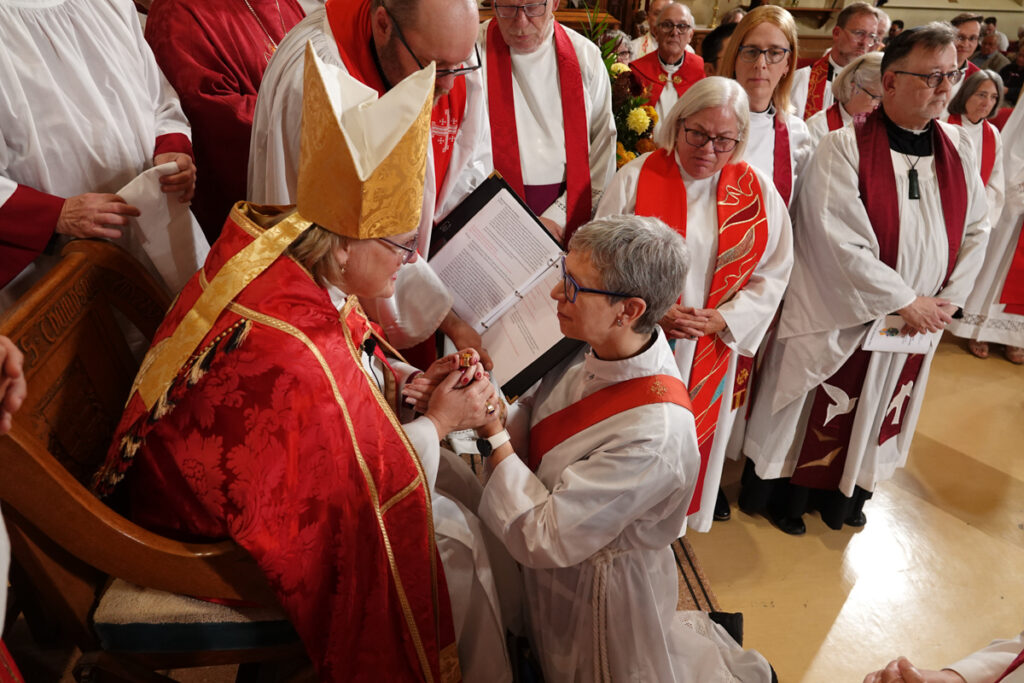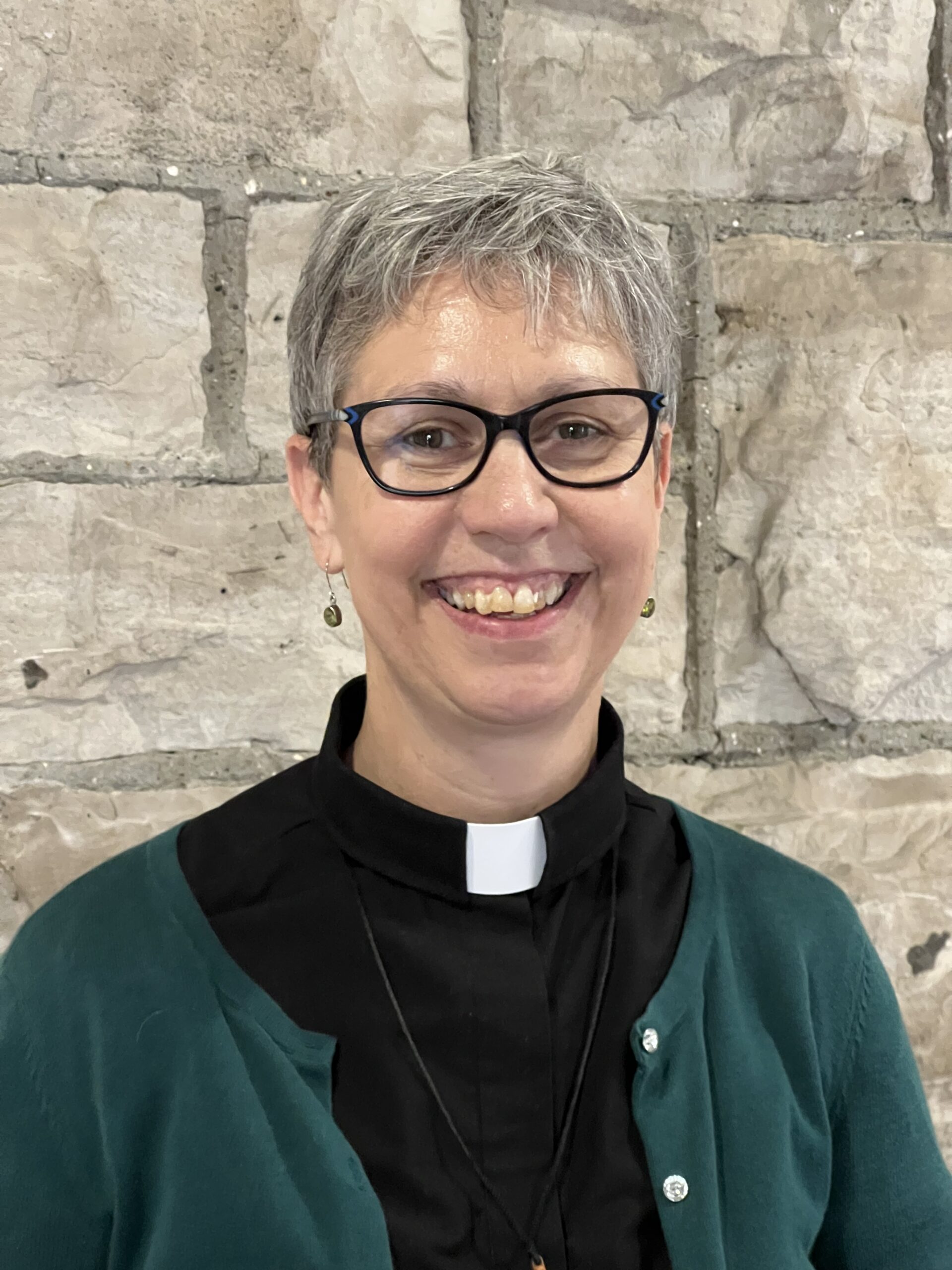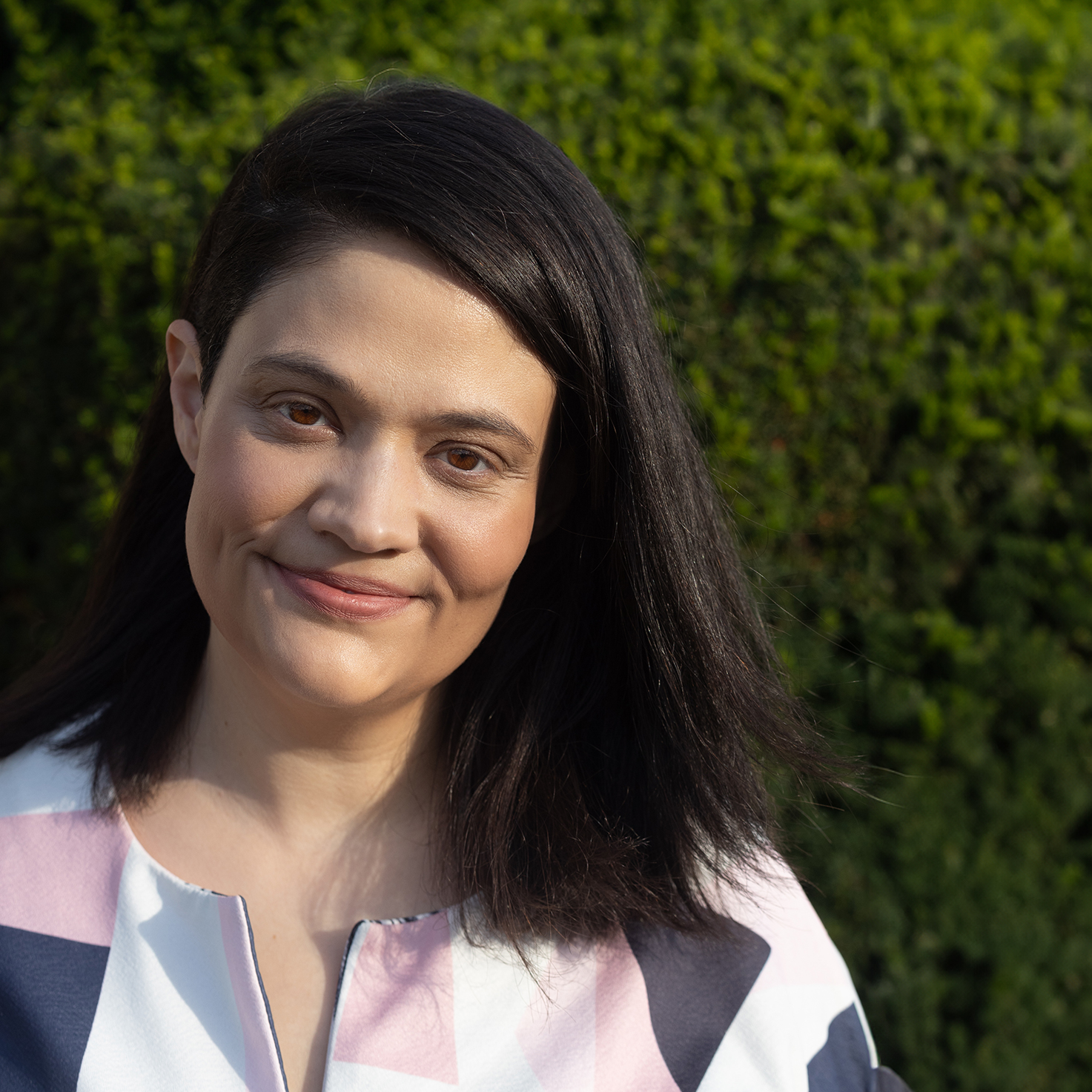Meet Monica Romig Green our New Faith Formation Coordinator
IN CONVERSATION WITH DANI LEITIS
In February Bishop Susan announced the appointment of a new Faith Formation Coordinator for the diocese. The Reverend Monica Romig Green began this new role on March 1st and immediately began working on her plans to support the formation of faith across the diocese.
Dani: Monica, you’ve become a familiar face around the Synod office and at diocesan services, but for those who haven’t had the pleasure of meeting you yet, could you introduce yourself?
Monica: My name is Monica Romig Green, and I am honoured to fill the two half-time roles of Priest Associate at Christ’s Church Cathedral and Faith Formation Coordinator for the Diocese of Niagara. I started in these positions at the beginning of March this year.
D: Where are you coming from? Can you share a little bit about your background?
M: I am originally from Southern California, where all my extended family still lives. When I tell people that I am truly a “California girl,” a lot of people ask me how I have ended up in Hamilton. In 2010, my husband, who is also American, decided to do PhD studies at the Toronto School of Theology. That brought us to Toronto for four years. We moved back to the States afterwards, grateful to have had a lovely Canadian adventure together. Little did we know how much we would both miss living in Canada! So, when I discerned a call to ordained ministry, we both wanted to come back to Southern Ontario, so I applied to the Diocese of Niagara. We moved to Hamilton in 2021, while I finished my MDiv studies at Trinity College, and we have been here ever since. We are both applying for permanent residency with the hopes of staying this time as long as we can. Prior to my call to ordained ministry, I had a series of careers, including a stint as a child actor in Hollywood. You probably wouldn’t recognize me in anything, but I did do a Canadian Sprite commercial in the late 70s, flying a kite with other kids! After university, I worked in the professional theatre as a company manager, writing and managing budgets and contracts for play development programs and arranging travel and housing for artists.

D: Can you share a little bit about your spiritual and/or vocational journey? I know you mentioned you have experience in faith formation.
M: Sure! I was raised in a Christian home and in a Protestant evangelical church, where I received a deep and solid foundation for my faith. I received my first “grown-up” Bible when I was ten and poured over it every night before going to bed. My faith really came alive when I was bullied in middle school, and prayer became a deep source of solace for me. I explored various Protestant churches in my teens and twenties, but it was my divorce at thirty when I really wrestled with my faith, with God, and with myself. I went to seminary in California and was in the first class of a master’s degree program at the Institute for Spiritual Formation, where I studied how people grow in their faith and was trained in the ministry of spiritual direction. It was during this time that I discovered the Episcopal Church, where the liturgy just caught hold of my heart and mind and never let me go! After I graduated with a masters in Spiritual Formation and Soul Care (the coolest title for a theological degree in my humble opinion), I worked at the Institute, where I taught spiritual formation and supervised spiritual directors. When my husband and I moved to Toronto, I began working for a Christian non-profit, where I co-wrote faith formation resources for churches and created and led a network for Christian spiritual directors. I have continued to offer spiritual direction for the last twenty years. After discerning a call to ordained ministry, I did internship placements at Church of the Nativity and St. Mildred’s-Lightbourn School and my curacy at Christ’s Church Cathedral. I graduated with my MDiv in 2024 and was ordained to the priesthood last September.
D: So, it sounds like it’s safe to say you are an expert on this particular topic! Can you explain what faith formation actually is?
M: Faith formation is a term that addresses how we grow in our relationships with God, ourselves, others, and the world as followers of Christ. The language of formation comes from Paul’s letter to the Galatians in which he says he is labouring as if in childbirth for Christ to be formed in them. Therefore, faith formation encompasses Christian education, learning about God and the Christian faith, but it also involves a lot more than that. It considers how people grow and change as Christians in ways that holistically involve our minds, our emotions, and our actions. It includes intentional practices and experiences that engage the heart, mind, and body to help shape how we live our lives and who we become as Christ followers. Because God is gracious, faith formation involves our participation to partner with God’s transformative work inside ourselves and in our lives.
D: Who is faith formation for?
M: Faith formation is for everyone, though my work will be focused on adult faith formation. It is for people just learning about the Christian faith, those who have been following Jesus all their lives, and everyone in between. Philosopher and theologian Dallas Willard said that everyone is constantly being formed by the beliefs, structures, and forces in the world around us. Christian faith formation is how we intentionally invite God to form us in God’s ways to be God’s people. Viewed this way, faith formation can be quite radical and countercultural. Additionally, faith formation never ends while we are alive. We never reach a point as Christians when we have fully reached the goal. No matter how briefly or how long one has been following Jesus, there is always more in us to be formed, to be shaped to be like Christ.
D: What is typically involved in faith formation?
M: Traditionally, faith formation involves classic spiritual practices, like study, prayer, worship, and service. However, since faith formation involves whatever helps us grow in love in our relationships with God, ourselves, others, and the world, there is room for a lot of creativity in how we engage in our faith formation. It can involve quiet and internal practices like contemplation, retreat, silence, and solitude. It can involve relational practices like spiritual direction, intentional community, hospitality, and discernment. It can involve communal practices like stewardship, acts of compassion, creation care, and missional interactions. And it can be playful, too, involving creative ways to pray, interact, and learn with God, others, ourselves, and the world, so long as we are intentional and open to how God might be forming us as we engage in all these experiences.
D: Are there common misconceptions about faith formation?
M: I think one of the most common misconceptions is that faith formation is only for children or people new to Christianity. I think over time, we can become complacent with our faith. We just do what we have been doing for years, or we end up with a “been there/done” that mentality, that we have already engaged in faith formation practices in the past, and there is nothing new under the sun. That can lead to a wistfulness for the excitement of the past and a lack of hope for the future. However, we only have to look at the lives of our faith forebearers in Scripture to realize that God continues to call all of us to grow in our faith formation throughout our lives, even to the very end. Sarah and Abraham, Moses and Miriam, Naomi and Boaz: God invited all of them to go deeper in their faith in the latter half of their lives, leading to profound new experiences in their lives with God that ultimately affected their community and the world.
D: Why is faith formation important to YOU?
M: Faith formation is important to me because it literally changed my life and continues to excite and delight me. I grew up being a very good girl in my faith, but it was when I engaged deeply with God with my questions and my heartbreak that I started to grasp how wide, long, high, and deep God’s love truly is. I realized how every aspect of my life needs to be bathed in and transformed by that love. Faith formation is my part in God’s work of transformation for myself and how I engage with the world. Even in the most challenging of circumstances, God’s work is full of possibilities, hope, and opportunities that I have yet to discover. As I continue to grow, I am so honoured and excited to get to come alongside what God has already started in the Diocese of Niagara and help us all to say yes to God’s timely invitations to engage more deeply and more richly with God and each other in our faith formation.
Monica’s work is to resource clergy and laity with a focus on Christian discipleship. Monica works closely with the diocesan missioners and assists the diocese to deepen the faith and engagement of those people already present in our churches, and to engage those who are seeking a safe community in which to ask meaning of life questions. Monica is available for consultation with parish leaders to resource and support faith formation initiatives.
Monica can be contacted at 905-527-1316 Ext. 250 on Mondays or Tuesdays or by email [email protected]


Resurrection of Hope in Thundering Waters